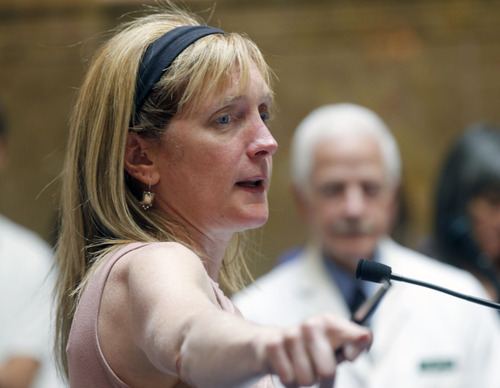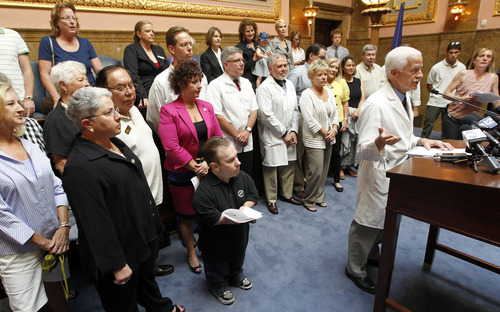This is an archived article that was published on sltrib.com in 2012, and information in the article may be outdated. It is provided only for personal research purposes and may not be reprinted.
A crowd of about 30 supporters at a consumer advocate-sponsored news conference in Salt Lake City Thursday were thrilled and surprised by the high court's decision on federal health reform.
Utah Health Policy Project's Executive director Judi Hilman said she woke up at 4 a.m. and prepared talking points for two scenarios, both of which struck down all or parts of the law.
"I wasn't really prepared for today's ruling," she said. "I still feel like I'm dreaming."
The handful of doctors and small business owners lauded the act's protections for consumers, from allowing adults to remain on their parents' plans until age 26 to forbidding insurance companies from denying coverage for preexisting conditions.
With an expansion in the number of insured Americans, pediatrician Chuck Pruitt said, he won't have to face patients who are "train wrecks" — whose conditions are so advanced and expensive.
He recalled a girl who finally entered the hospital after enduring months of headaches. "When she came to me her brain tumor was so big that it was inoperable. She's resting in peace now but she reminds me that too often that patents who don't have health care delay their care. They wait and they come to the emergency department. ...
"This decision today is a victory for my patients ... [and] for my fellow taxpayers. This decision today is a victory for civil society such that we can return to the good old days where we lent a hand to those less fortunate than ourselves."
While opponents point to the Supreme Court's decision that considers the law a tax — a likely talking point as Republicans try to repeal the law — supporters note Americans are already paying for the uninsured through higher premiums, covering care for the sick when they enter the emergency room.
"That's my tax that I pay," said physician Tom Metcalf.
Added pediatrician Ellie Brownstein: "We're paying more than we would be if we were really taking care of people."
Hilman's group still has work ahead, though, hoping to convince Utah to expand Medicaid, the path to insurance for 138,000 working poor Utahns under the health law. The court upheld the expansion, but made it optional for states.
Hilman said she will remind lawmakers of the "magical moment" in 2007 when business and government leaders through the United Way financial stability council essentially endorsed Romney's Massachusetts health plan.
She'll make the case that single adults making under $12,000 a year, those at 133 percent of federal poverty, don't have access to health benefits through their employers.
Sen. Pat Jones, D-Salt Lake City, was at the news conference and said she hopes "everyone will step away from making this so political."
Jennifer Hyvonen, from Fourth Street Clinic in downtown Salt Lake City, said expanding Medicaid is a no-brainer, considering the federal government will cover all of the expansion costs for two years and 90 percent of the costs afterward.
Homeless patients at the clinic typically don't qualify unless they are disabled or have dependents. When the clinic has sought to get Medicaid coverage on a hardship basis for dying patients, she said, the state has refused to cover hospice, but ultimately covered the costs when the patients ended up intubated in an intensive care unit.
She anticipates 60 percent of the clinic's patients could be on Medicaid by the end of 2014.
"If we could get those patients on Medicaid prior to that crucial care stage, we could save the state a lot of money," she said.





